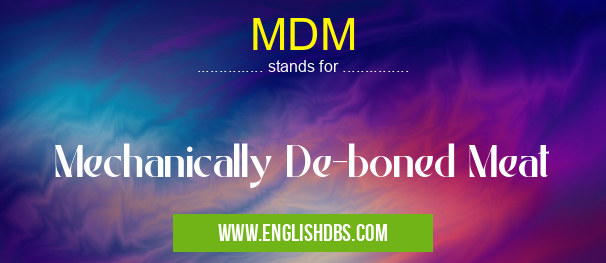What does MDM mean in FOOD & NUTRITION
Mechanically De-boned Meat (MDM) is a process of extracting meat from carcasses, bones, and other animal byproducts. This process is usually done using machines to extract the meat from the bones with accuracy and efficiency. This process is used in many industries including food processing, pet nutrition, leather making, pharmaceuticals and more. MDM is a popular ingredient in processed foods because it provides an economical way to add bulk to products while providing great taste and texture.

MDM meaning in Food & Nutrition in Miscellaneous
MDM mostly used in an acronym Food & Nutrition in Category Miscellaneous that means Mechanically De-boned Meat
Shorthand: MDM,
Full Form: Mechanically De-boned Meat
For more information of "Mechanically De-boned Meat", see the section below.
What Is Mechanically De-boned Meat (MDM)?
MDM involves the use of specialized machinery to separate edible meat from various animal bones such as chicken carcass or pig trotters. The machines have blades that are designed to make precise incisions into the bone and surrounding tissue allowing for extraction of only the edible parts without any contamination or damage. It’s similar to manually de-boning but requires less time and effort as well as being more efficient with regards to yield and product quality. MDM typically yields a high proportion of leaner muscle compared to hand de-boning which often includes some fat, bone fragments or cartilage.
Advantages Of MDM
The primary benefit of using MDM is its ability to accurately differentiate between the edible meat portions and inedible ones on a carcass ensuring maximum amount of usable product with minimal waste. Additionally, it creates a uniform product size which makes it easier for manufacturers to produce processed foods quickly since they don’t need to sort through different types of pieces manually. Moreover, this method also eliminates any potential contact between workers and harsh chemicals or contaminants found in raw meats which reduces any health risks they may face when working with raw materials.
Essential Questions and Answers on Mechanically De-boned Meat in "MISCELLANEOUS»FOOD"
What is MDM?
MDM stands for Mechanically De-boned Meat. It is a type of meat production method where the bones are removed from carcasses of animals using machines such as mincers and grinders. The result is a product with highly uniform consistency and texture, although much of the taste profile will be eliminated in the process.
How do I know if I have purchased MDM?
All commercially sold MDM products are labelled accordingly, and usually include the term "mechanically deboned" or "de-boned" clearly indicated on the packaging.
Is MDM safe to consume?
Yes, when produced under strict regulation – which applies to all food production in most countries – MDM is considered safe to eat as it must comply with hygiene standards and other safety requirements.
Is MDM suitable for vegetarians?
No, since it includes animal by-products. Vegetarians should always check labels before consuming any processed foods due to potential hidden ingredients.
What animals does MDM use for its production process?
The main meats used in MDM processes come from cattle, sheep and pigs (or hogs). However, it can also be made from chicken, turkey and other fowls.
Does MDM contain additives or preservatives?
Generally speaking no, however this depends on the exact product- some may include added chemicals such as flavorings or coloring agents. As always, read product labels carefully before consuming anything.
What is the nutritional value of MDM?
Nutritionally speaking, since much of the bone structure and muscles are removed during processing there can be variations in nutrient content depending on the source meat used. Generally speaking though you can expect higher fat content than with unprocessed cuts.
What is MixingMDM?
MixingMDM is a mechanical deboning technique which involves mixing together different kinds of meat products – often including larger pieces which will not pass through the mincer's blades – to create more uniform mince product that has an even texture throughout.
Are there any risks associated with consumingMDM?
Generally speaking no more so than with consuming any other type of processed meat product; however it should be noted that while much of the bone structure has been removed during production there can remain small pieces which could present a choking hazard if swallowed whole.
Is MDMand organic product?
No – although many producers use grass-fed livestock whenever possible – organic labeling does not apply to mechanically deboned products as they have been processed beyond what would classify them as organic according to international standards.
Final Words:
In conclusion, Mechanically De-boned Meat (MDM) offers several advantages over manual de-boning for food producers around the world including increased overall safety due its highly accurate separation process as well as better production efficiency thanks to its accurate uniform sizing capabilities. With these key benefits plus others such as improved quality control leading to greater consumer satisfaction, MDM offers food manufacturers an excellent way for them to produce processed foods at scale while minimizing costs associated with labor and waste generated during production processes
MDM also stands for: |
|
| All stands for MDM |
